
Today, we’ll be interviewing an Educator from Poland and as always it’ll be really informing. Enjoy the interview!
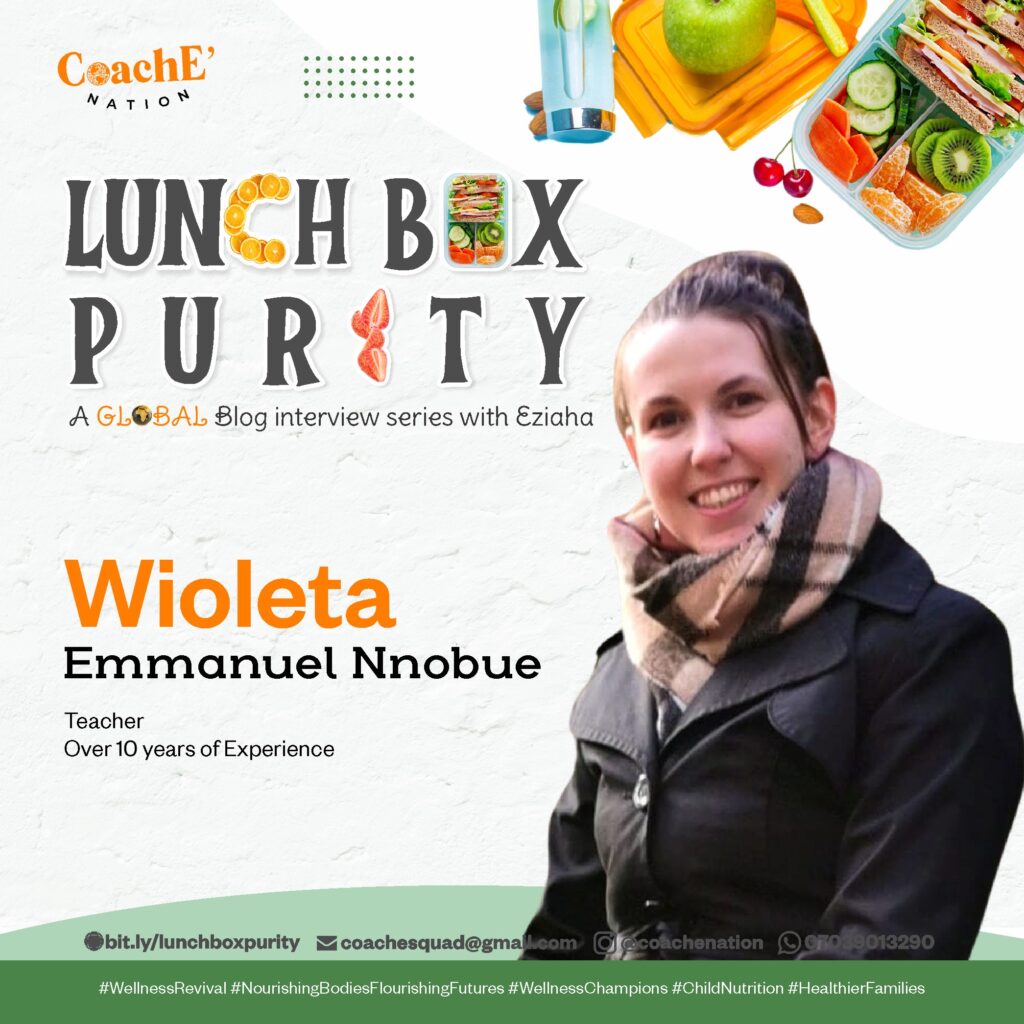
1. Please tell us your name, where you currently teach years on the job and how you got into the beautiful world of education
Answer
My name is Wioleta Emmanuel Nnabue, I have been involved in education for over ten years. I am currently taking a break from teaching at school but I am teaching in the church while doing further studies at the same time, and taking care of my own kids. From my childhood, I always wanted to become a teacher. When I was a teenager I started as a babysitter to gain experience in taking care of children, then I started studying psychopedagogical care to become a school teacher. However, it was only when I started working in the first kindergarten that I realized how much I love working with children and how much joy it brings me. Seeing children change and develop became my motivation to act. It’s amazing how much of an impact we have on every child we teach. In primary school, I saw how many problems children struggle with on a daily basis, which motivates me to pray for them and further my own development, so that I can give them as much as possible, not only the knowledge, but also the help they need.
2. Your most significant/memorable experience as an Educator
Answer
My most memorable experience as a teacher is meeting my students after years, when I taught them as toddlers and now I meet them as teenagers, and they still remember me and have good memories
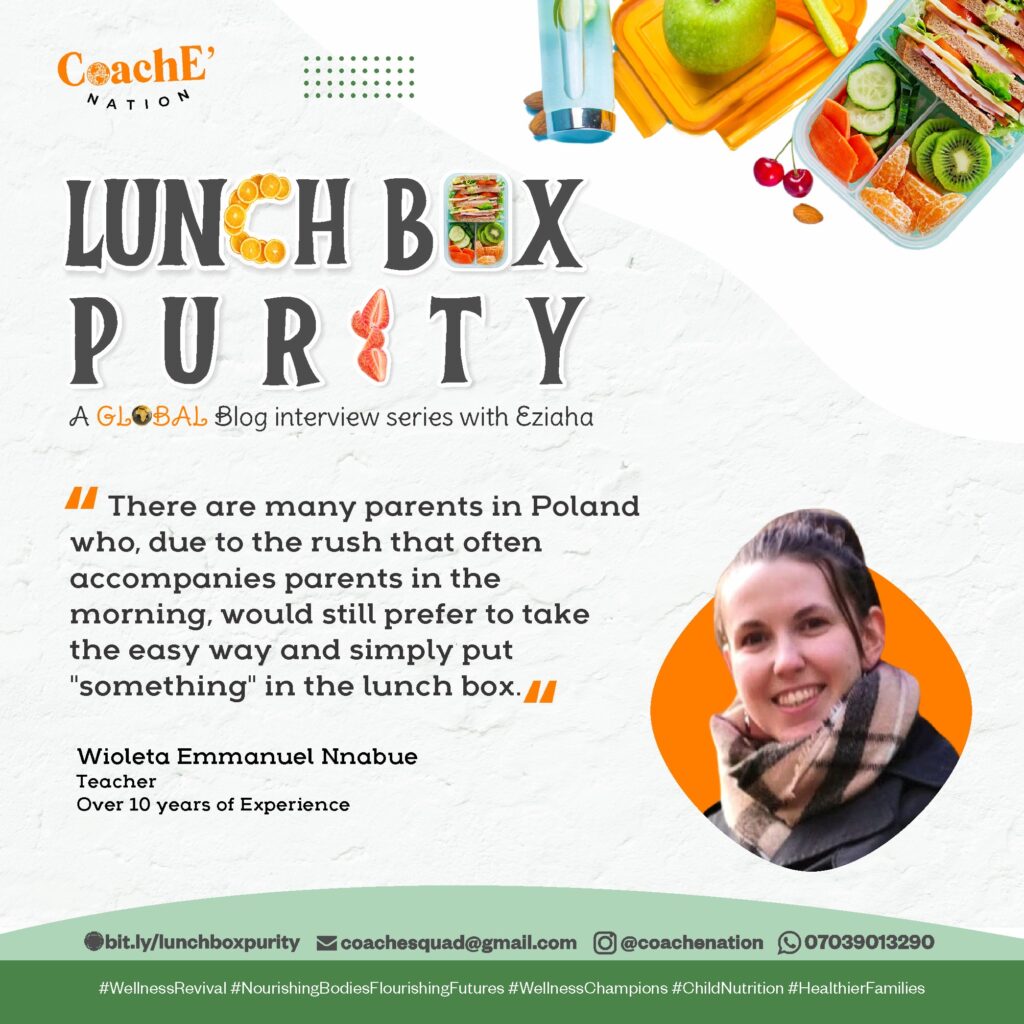
3. Is it actually possible for a school to eliminate junk in the lunch box of our children as opposed to having a few days a week where junk is not allowed? If no, why?
Answer
I think it is impossible to completely eliminate junk food from children’s lunch boxes. This is because there are many parents in Poland who, due to the rush that accompanies parents in the morning, would still prefer to take the easy way and simply put “something” in the lunch box.
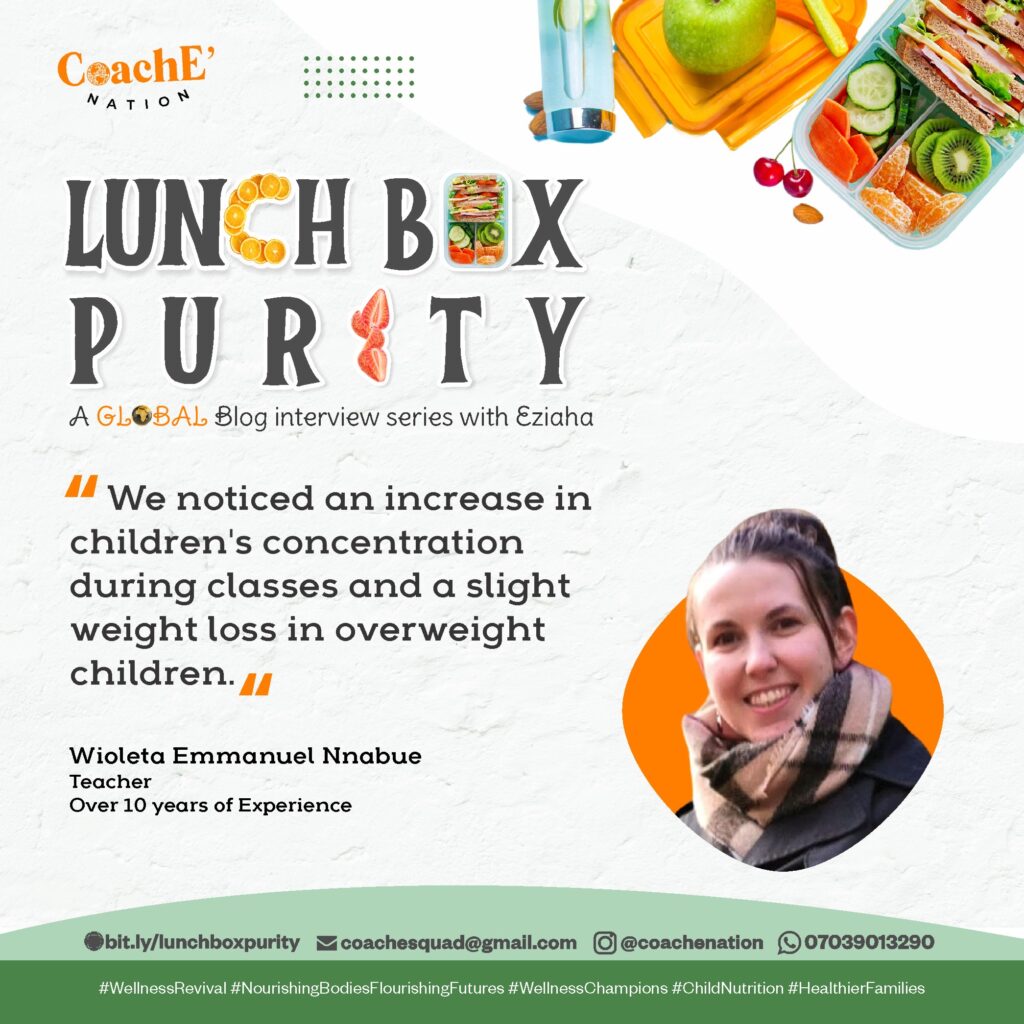
4. Have you ever been a part of a transitioning process in the school? By this, I mean where the school decides that we would have junk-free days a few times a week, or even junk-free days everyday. If yes, how was that transition process and what was the outcome like? What impact did you see in the children? And if you were to help another school transition, what are the best practices you would recommend to make it seamless?
Answer
I was part of a team that introduced nutritional changes in children’s lunch boxes. Together with teachers of grades 1-3, we decided at a meeting that there was a need to change children’s nutrition and we chose 3 days a week when children were not to bring any junk food to school. We provided the information to parents via e-mail and received a very positive reaction from them. The process was successful. Thanks to the changes, we noticed an increase in children’s concentration during classes and a slight weight loss in overweight children.
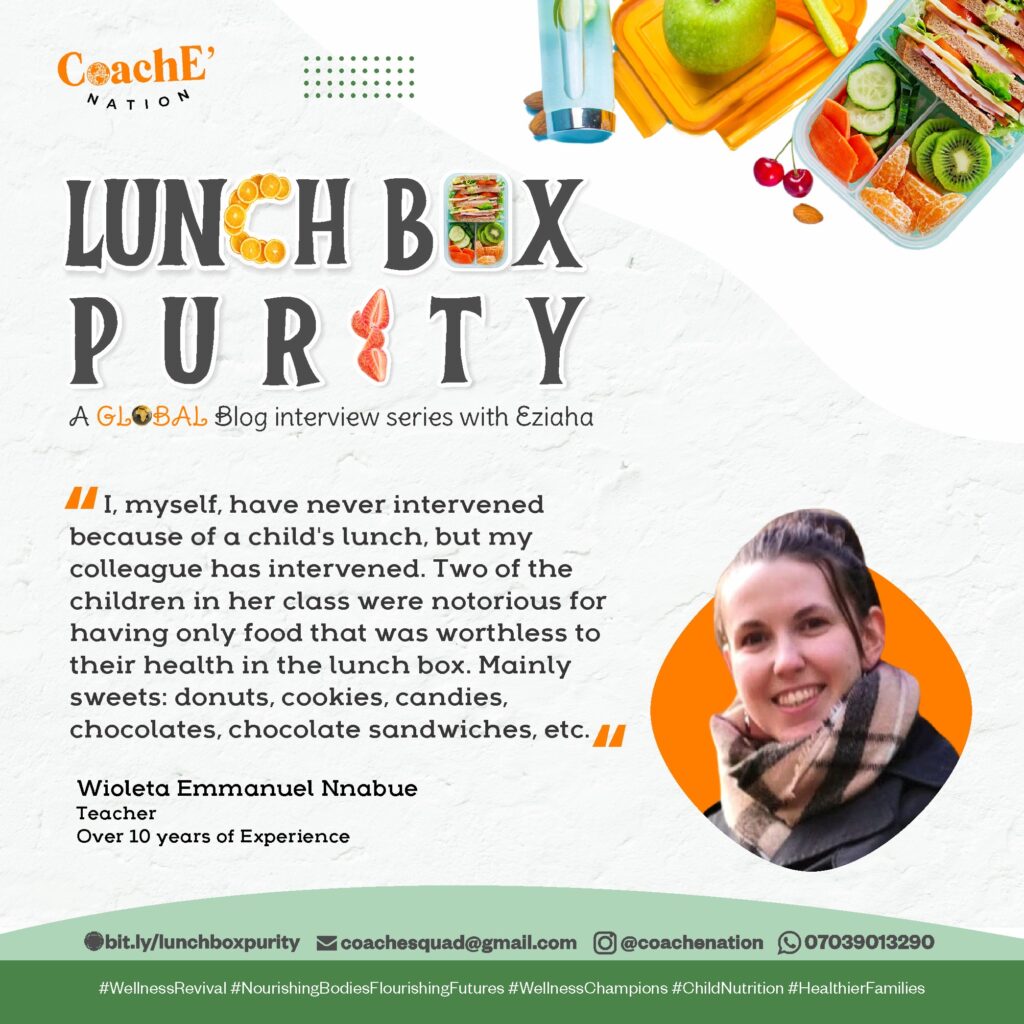
5. Are there times when an Educator (you or someone else) has had to intervene per the content of a child’s lunch box, especially when you can see that the frequency and volume can negatively impact on the child’s health both short term and especially long term? If yes, how did that go and/or how can an Educator help/intervene without coming across as being judgmental? How do we educate that child and/or the parent into better and healthier decisions?
Answer
I myself have never intervened because of a child’s lunch, but my colleague has intervened. Two of the children in her class were notorious for having only food that was worthless to their health in the lunch box. Mainly sweets: donuts, cookies, candies, chocolates, chocolate sandwiches, etc. The teacher first talked to the children’s parents, the next step was to conduct classes on healthy eating and Create a food pyramid. The next step was a meeting with a dietician, and finally, the introduction of “Healthy Days” , and warning children to have a healthy snack in their lunchbox every day.
6. How can the Government, Federal or state, throw their weight behind schools (in terms of policies for example) in the fight to ensure that at least within schools, child nutrition is front and centre?
Answer
Our government takes care of children’s healthy nutrition primarily by providing children with a balanced diet during their lunches, providing additional vegetables, fruit and various types of dairy products as an after-dinner snack, and meetings with a dietician and dentist who conduct classes on healthy eating.
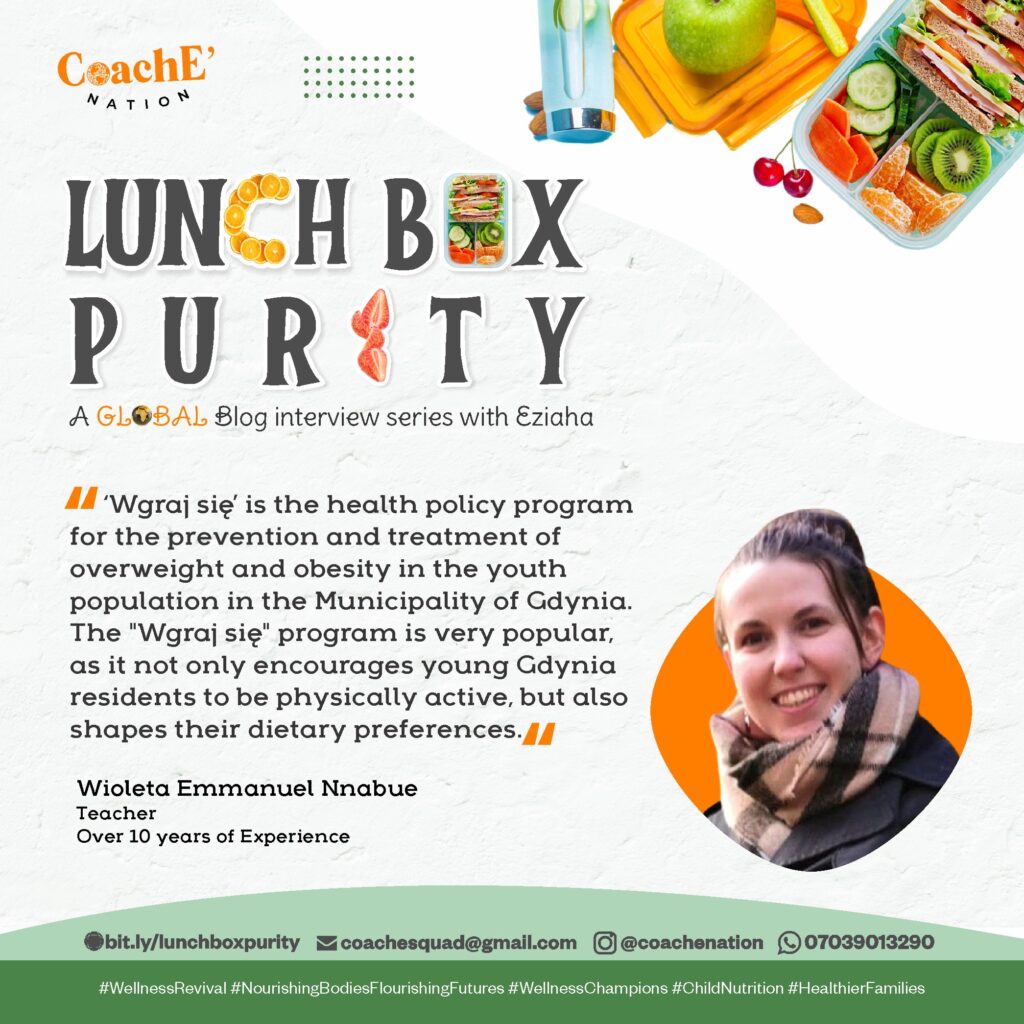
7. What Policies/Practices does your school have in place to ensure healthy eating for children while at school? What have you found to work and have you faced any challenges in implementing them? Maybe culinary or nutrition-related events? Please share memorable experiences from these if any?
Answer
One of the ways to support healthy eating in schools and kindergartens in Poland is by introduction of different kind of Programs:
• “Witaminki” program. As part of the project, we will undertake various activities to promote healthy eating habits. We want to shape the culture of eating healthy meals in children from an early age, dominated by vegetables. Project goals promoting healthy eating habits;
- encouraging kids to eat a variety of dishes rich in vegetables;
- creating opportunities to discover new tastes;
- getting used to the appearance of vegetables and learning about their nutritional values;
- introduction to self-composing meals and preparing simple dishes according to culinary recipes- Check here for more.
- “ORBIT zdrowy uśmiech” dentist program for kids.
- “Program dla szkół” As part of the “Program for Schools”, healthy, natural-tasting products are delivered to educational institutions. Students are also provided with knowledge about a properly balanced diet and the origin of fruit, vegetables and dairy products. The main goal of the program is to change children’s eating habits. Diversifying their diet with vegetables, fruits and dairy products at an early stage of adolescence allows children to get used to their taste – and simply like them! See more here.
- Health policy program for the prevention and treatment of overweight and obesity in the youth population in the Municipality of Gdynia.” The “Wgraj się” program is very popular, as it not only encourages young Gdynia residents to be physically active, but also shapes their dietary preferences. The obesity prevention program is one of several that deal with changing habits.
8. If your school gives the children lunch in school, whether optional or compulsory, how do you take kids with special dietary conditions into consideration, ensuring that they are also all-round well-nourished?
Answer
Lunch is optional in Polish public schools, but unfortunately children with special diets are not particularly taken into account. Dinners are divided into a general meal, i.e. vegetables/salads, meat/fish and side dishes (rice, pasta, potatoes, groats, etc.) and lactosefree meals. In any other diet, the meal must be provided by the parents.
I am sure you learnt a lot from this short but really informing interview. Next week Monday, we are featuring our nineth Superstar Educator. They actually don’t get to answer the same set of Q’s so get excited about reading a wide array of Q and A’s!
And please support and spread the WORD that the LUNCH BOX PURITY blog series is LIVE!
You can create your own customized flier here and then share the link to the amazing Parents and Educators in your circle.
Ok, see you next Monday with our Super star Educator talking LUNCH BOX PURITY!
With all my HEALTHY Love!
Eziaha,
Wellness Revivalist and Lunch Box Purity
PS
Follow me on my brand new IG here after being away for over four years, and on LinkedIn here. My YouTube channels is value-choked and you can join that family here

